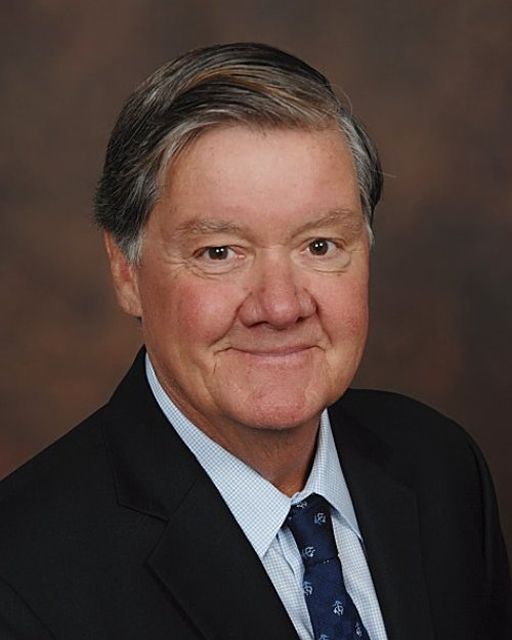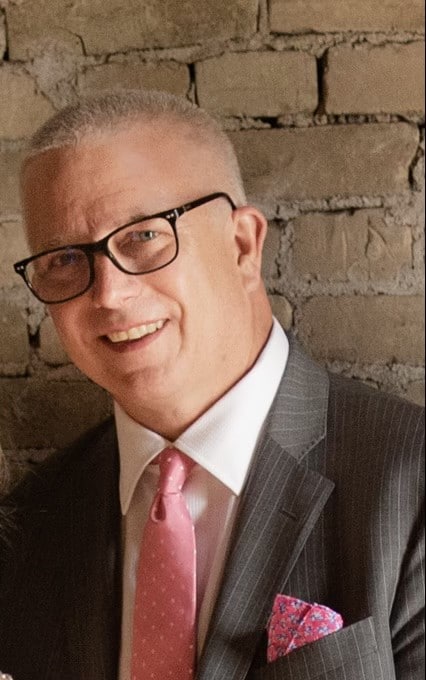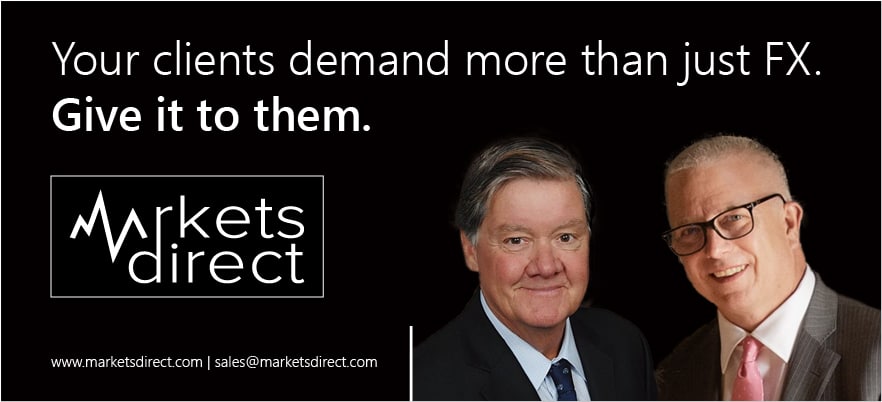Markets Direct has caught the finance world’s attention in recent months with its multi asset offering that sets brokers apart from their competitors.
A sponsor of iFXEXPO Dubai, the Markets Direct team has been busy onboarding some of the world’s top brokers who can now add fractional cross margin trading to their offering.
The success of Markets Direct and its stellar offering has prompted curiosity about the brand and its leadership.
And today, in a Finance Magnates Exclusive, we meet two members of the veteran leadership team behind the Markets Direct Success.
We learn how they got started, how the world of trading and technology has changed since the 70s, and how their expertise and knowledge of the sector continues to set them apart from the rest.
This is a must-read interview for brokers, fintechs and challengers. Meet Markets Direct CEO Joseph O'Mara and Markets Direct Business Development Director Tom O’Reilly.

Tom O’Reilly, Markets Direct Business Development Director
How did you get started in the world of finance/trading?
TOM: I started in Forex as a spot broker 44 years ago in 1977, about the same time the fixed wing airplane was invented. I was just finishing college and went to downtown New York to seek work from an employment agency. They sent me to an interbank voice broker called Mason’s, where I cut my teeth sending out ticker tape trade confirmations and making coffee.
JOSEPH: I started on the trading floor as a runner at the Old Midwest Stock Exchange and the CBOE after my freshman year of college as a summer intern. It was fascinating and I had very few skills but was born to a mathematician (my father), so was intrigued by the rudimentary arbitrage possibilities. The action and excitement immediately grabbed my attention.
What was the trading world like when you started?
TOM: This is probably very hard to imagine, but at that time there was no technology. Zero. We sat shoulder to shoulder in our three-piece suits in a smoke-filled room getting bids and offers from our bank trader friends, and “making a market” by individually pressing buttons on a 120 bank phone turret and broadcasting the rates to the banks. “24 bid Canada, looking for an offer.” I still get nightmares. We wrote the trades on a yellow pad – Seller, buyer, currency, rate – and verbally checked out with each bank at the end of the day. If there was a discrepancy, you had to go into the tape room and try to find the conversation on big reel to reel tapes. Later, we had microphones to shout out the markets to all the banks at one time. We would all have a three-foot wall of speaker boxes in front of us, each one with a bank name label. You had to learn the art of recognizing all the traders’ voices. 7 AM to 5 PM, lunch at your desk, and out on the town with the banks two or three nights a week.

Joseph O'Mara, Markets Direct CEO
JOSEPH: Trading was vastly different than it is now. Thirty years ago, it was more personal and an exercise in reading emotions and body language to ascertain individual intentions. Our younger millennial and GenZ team members love our old “no tech” stories but I don’t think they can picture it! That said, the camaraderie was great. There was much more interaction with no screens to separate us all and the buzz was immense.
How has the trading world changed since then?
TOM: Somewhere in the mid 90’s, a company called EBS came along and ended the era of the voice broker, much like the asteroid killed off the dinosaurs. EBS and Reuters were essentially matching engines where bank traders could now just input their bids and offers on a keypad. Gone in a flash was the shouting and yelling in dealing rooms like Morgan Stanley or Citibank, replaced by the quiet tapping of the keys. Gone were the voice brokers. Gone were the nights out. Back came my health. This was the advent of technology. I left my career as a voice broker in 1997, after twenty years. No regrets. I joined EBS, then entered the world of retail FX in 2003.
JOSEPH: The trading world has obviously vastly changed due to technology and efficiency. It is now more about using technology to read market directions and act accordingly.
What challenges have you faced in the last year?
TOM: I wouldn’t term them challenges, but more of an awakening. Remote working because of covid, made us realize that we can become more productive overall. Time commuting can now be spent working or indeed just drinking a coffee! Zoom calls ad nauseum. On the flip side, personal meetings with colleagues and clients have become much more difficult. Not sure where this will all shake out, but I envision that there may be a glut of office space out there in the near term.
JOSEPH: The past year has certainly created its own set of issues. Being both old and old school, I believe in human interaction. I have a strong belief in face-to-face meetings to develop business relationships and that has been pretty much non-existent so that has presented its own difficulties. The Dubai show presents us with an opportunity to go back to the business climate I embrace.
What do you think are the biggest challenges that brokers face today?
TOM: Again, not so much challenges as the new reality. Competition, regulatory oversight, keeping ahead of emerging trends and client demands. If nothing else, the absurd success of companies like Robinhood proves that oftentimes the hot new trend foreshadows the technology. And sometimes it’s the other way around. In this case, I think the trend was initiated by a desire for the small player if you will, to invest in the stock market in pieces to fit his or her wallet. Fractional share trading, or more accurately micro investing. I don’t know too many 20- 30 year olds who don’t have a Robinhood or TD app on their phones.
JOSEPH: Bandwidth. We have faced a growing retail presence, globally. Customers want to trade on mobile apps and access the markets on their terms. Fractional share trading is growing exponentially here in the states. It is also more inclusive which is something we really believe in here at Markets Direct. This has democratised trading for everyday people not just the rich wall street guys!
How does Markets Direct solve problems for today’s brokers and fintechs?
TOM: Having been in the retail FX business for many years, I’m often amazed at how quickly successful brokers can spot trends and through a combination of technology and marketing grow their business. At the end of the day however, they all offer a homogenous product. Sure, there’s CFD’s and cryptos and indices to add to the standard FX offering, but much of the difference is in the presentation. Markets Direct presents the opportunity for brokers to break out of the circle. It’s not just a technology solution, but rather a way to cast a much wider net. Reach the huge stock trader market by offering fractional share equities who want to build a portfolio by purchasing $100 worth of Apple or half a share of Tesla. Real stocks traded on Exchange, not CFD’s. Supplement or hedge your portfolio with mini S&P’s on the Futures Exchange. And of course, trade and manage their positions in FX and cryptos. One account, cross margined, on familiar front ends like MT5, CQG, or Netdania.
JOSEPH: Markets Direct solves many problems for brokers globally. We are approved as a QID (qualified intermediary) to handle corporate actions for third party brokers, thereby giving access to the much-coveted US futures and equity markets. Increasing regulatory pressure will continue to weigh on the OTC markets. Utilising the extensive experience of our management team is a big draw for brokers.
What advice would you give brokers and fintech service providers to gain an edge in this intensely competitive landscape?
TOM: Look ahead, see what’s going on around you, and know what’s around the pike. Spot emerging trends and react to them quickly. In the days of voice brokers and bank traders that I described above, the very best were invariably those who could think fast on their feet. They often grew up on the streets of East London. Not big on formal education. but they had street smarts and energy to burn the candle at both ends. You were often burned out by the age of thirty. Today is different; the market is much more cerebral, education is a virtue, and technology rules the day, but never be afraid to break out of that square box.
JOSEPH: We have close relationships with several of the larger broker dealers and FCM’s here in the states and are amazed at the growth curve. There are brokers here in the states that are literally opening 1 million plus accounts a month. It’s not about reinventing the wheel but about mirroring the practices of these successful brokers.
You are one of the main sponsors of iFX EXPO 2021. What are looking forward to the most at this event?
TOM: It will be nice to crawl out of our hiding places and see our peers again, even if we just fist bump. Personally, I feel that we at Markets Direct have a real story to tell. Many years of development and long days and nights have gone into the product, and it is not by any means just another platform. We have succeeded in melding trading on-exchange with off-exchange. Access to Exchanges and OTC. Trading and investing.
JOSEPH: I look forward to getting away from my six kids. All kidding aside, I look forward to exchanging ideas and innovations with people familiar to our space.
What’s next for Markets Direct?
TOM: In a way, we’re just coming out of the gate, and we’re very keen to showcase our product. We’re a small group of seasoned veterans from the FX, Futures and Equity world, New York, Chicago, London, with an idea and vision for that turn in the pike ahead. We look ahead to adding more regional equity and futures exchanges and cryptos. Enhancing our technology, building our team, and working together with partners and brokers that share this vision.
JOSEPH: We feel strongly that we’ve built an innovative platform giving access to the USA futures and equities space. We have a strong team of industry professionals that have addressed most of the caveats in the space. We look forward to sharing our knowledge and growing with our partners as the business continues to evolve.
Finance Magnates wants to thank Tom and Joseph for a great interview and the kind of insights we can only glean from extensive grass roots experience.
Give your clients a slice of the action with multi-asset trading and cross margining from one account. To book a consultation with the Markets Direct team or just to connect, please click here.
















